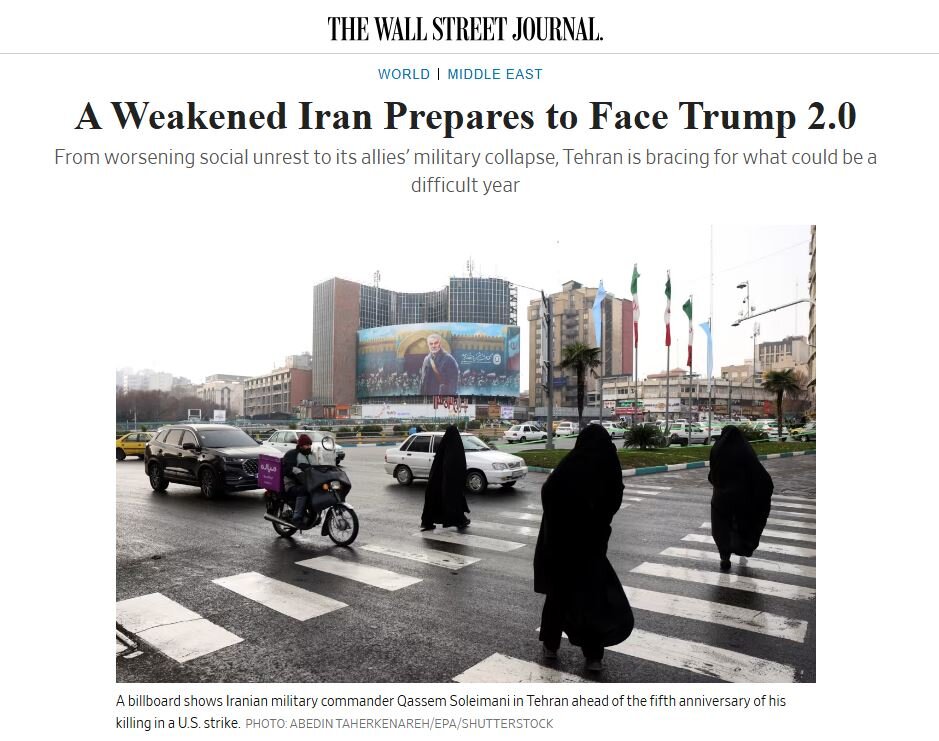Irans resilient stand beyond headlines
Iran’s resilient stand beyond headlines
TEHRAN – Benoit Faucon in his recent article for the Wall Street Journal, titled “A Weakened Iran Prepares to Face Trump 2.0,” paints a bleak picture of Iran, describing a country teetering on the brink of collapse.

While it is true that Iran faces substantial challenges, a closer and more balanced analysis reveals a different story. Many of the claims in the article seem shaped by geopolitical agendas, presenting a narrative that requires a thorough and fair reassessment.
Iran’s current economic difficulties are undeniable but often misrepresented in Western narratives. The article attributes these challenges mainly to internal mismanagement and corruption while downplaying the crippling impact of decades of U.S.-led sanctions.
These sanctions, often imposed unilaterally and outside international legal frameworks, have severely restricted Iran’s access to global financial systems, essential imports, and foreign investments. The sanctions have targeted critical sectors like healthcare and energy, disproportionately affecting ordinary citizens.
Despite these obstacles, Iran has demonstrated remarkable resilience. The government has made efforts to diversify the economy, foster regional trade partnerships, and invest in self-sufficiency initiatives across agriculture, pharmaceuticals, and renewable energy.
Iran’s nuclear program: peaceful intentions misrepresented
A frequent topic in discussions about Iran is its nuclear program, often clouded by misinformation. The article suggests that Iran might accelerate its nuclear activities to restore deterrence. However, such claims ignore Iran’s repeated assurances of its peaceful intentions.
As a signatory to the Nuclear Non-Proliferation Treaty (NPT), Iran has consistently affirmed its commitment to using nuclear technology for peaceful purposes.
Regular inspections by the International Atomic Energy Agency (IAEA) have verified the program’s compliance.
Additionally, Leader of the Islamic Revolution Ayatollah Ali Khamenei’s religious decree against nuclear weapons underscores Iran’s principled rejection of weapons of mass destruction.
Iran’s pursuit of nuclear energy is driven by legitimate needs for energy security and scientific development.
The collapse of the Joint Comprehensive Plan of Action (JCPOA) in 2018, following the U.S. withdrawal, marked a significant setback for diplomacy. Iran’s subsequent nuclear advancements should be seen as a reaction to unfulfilled commitments by other signatories. Tehran has consistently expressed its willingness to return to full compliance if sanctions are lifted and trust is rebuilt.
Regional influence and defense policy
The article claims that Iran’s regional influence is waning, citing challenges faced by the Resistance Axis in Lebanon, Gaza, and Syria. While West Asia remains a volatile region, Iran’s role is best understood as one of resistance to foreign intervention and support for regional sovereignty.
Despite claims of diminishing military capacity, Iran continues to maintain robust defense capabilities. Its advancements in missile technology and indigenous defense systems serve as a deterrent, ensuring national security in a region fraught with external threats. Iran’s defense policy remains fundamentally defensive, designed to protect sovereignty rather than pursue expansionism.
The article further highlights social unrest in Iran as evidence of a government in decline. While dissent and protest are natural in any society, especially one under economic and social pressures, Iran’s government has shown a willingness to engage with public concerns.
Recent steps include softening certain restrictive social policies. For example, lifting bans on specific digital platforms reflects an effort to address demands from younger generations.
Diplomacy: a path forward
Iran’s readiness to negotiate is often overshadowed by accusations of inflexibility. However, statements from officials, such as Foreign Minister Abbas Araghchi, emphasize Tehran’s willingness to resume nuclear talks if sanctions are lifted. Iran insists on fair negotiations that respect its sovereignty and national interests.
The U.S.’s “maximum pressure” campaign failed to achieve its objectives, instead deepening mistrust and exacerbating tensions. Despite this, Iran has shown resilience, maintaining its regional commitments and scientific advancements. The international community must now prioritize constructive engagement to avoid repeating past mistakes.
While the challenges facing Iran are significant, the narrative presented by much of Western media often exaggerates its vulnerabilities while overlooking its strengths. Iran remains a nation that has consistently demonstrated resilience in the face of economic hardship and diplomatic isolation.
Iran’s story is not one of defeat but of perseverance and determination, as its people continue to strive for dignity and progress amidst adversity.
source: tehrantimes.com